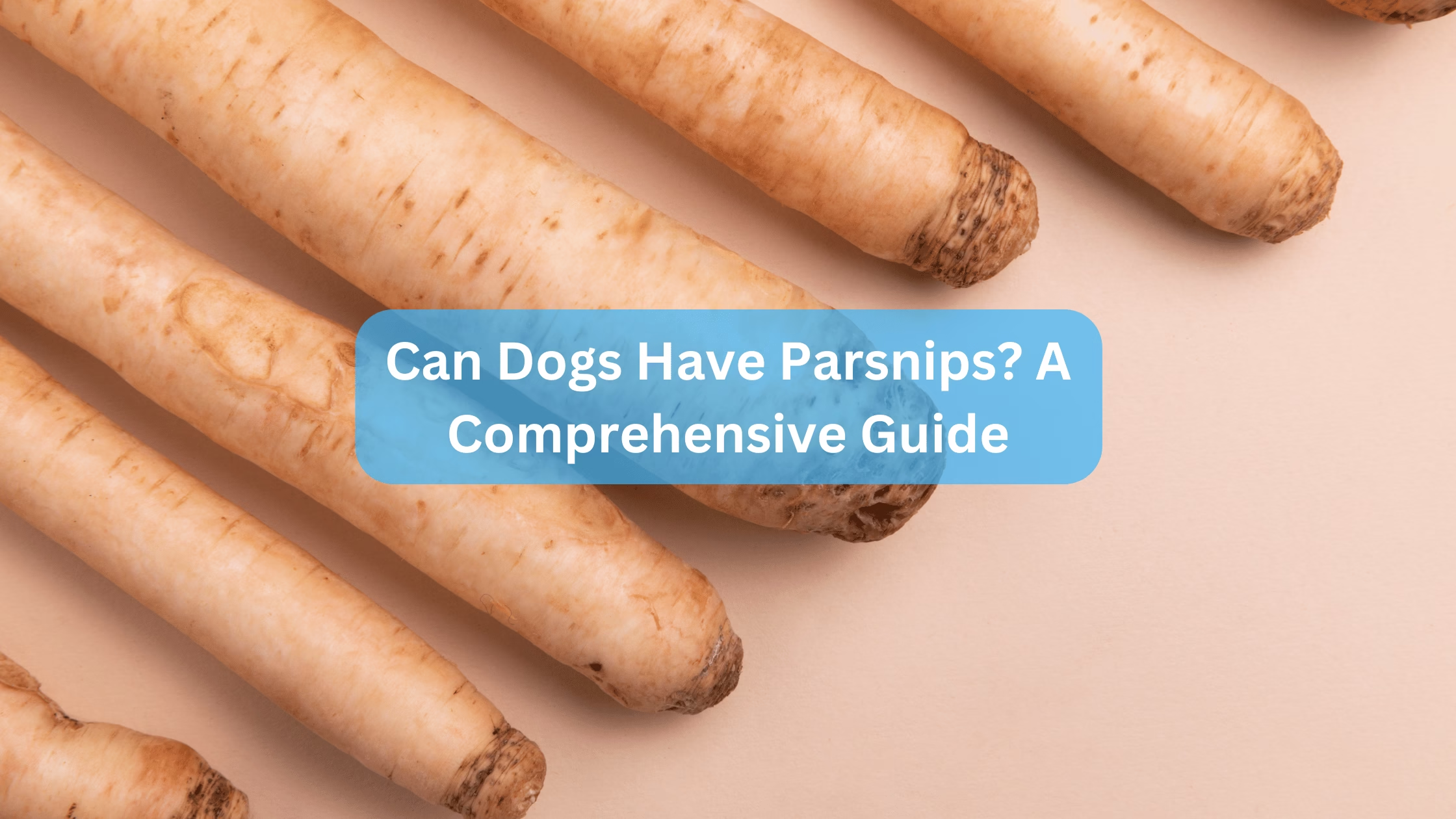Can Dogs Have Parsnips? Parsnips are a nutritious root vegetable that can be a healthy addition to your dog’s diet when prepared correctly.
This article explores whether dogs can eat parsnips, their benefits, how to prepare them, potential risks, and considerations for puppies and dogs with diabetes.
Additionally, we will address how often parsnips can be fed to dogs, symptoms of overconsumption, and how they compare to other vegetables.
Can Dogs Have Parsnips?
Yes, dogs can eat parsnips! These root vegetables are safe and provide various health benefits.
Parsnips are rich in vitamins and minerals, including vitamin C, B6, and potassium, and are high in both soluble and insoluble fiber, which promotes healthy digestion.
What Are the Benefits of Parsnips for Dogs?
Parsnips offer several health advantages for dogs:
- Nutritional Powerhouse: Parsnips are packed with essential vitamins and minerals, including vitamins B1, B2, B3, B5, B6, C, E, and K, as well as calcium, iron, magnesium, and potassium.
- Digestive Health: The fiber content in parsnips aids digestion, promoting regular bowel movements and overall gut health.
- Antioxidant Properties: Parsnips contain antioxidants that can help combat oxidative stress, potentially reducing the risk of diseases such as cancer.
- Low in Calories: They are low in calories, making them a healthy treat option for dogs, especially those that need to maintain a healthy weight.
- Heart and Kidney Health: The potassium in parsnips supports heart function and may be beneficial for dogs with kidney issues, as it helps stimulate kidney function.
Can Puppies Eat Parsnips Safely?
Puppies can eat parsnips, but caution is advised. Raw parsnips can be tough and may pose a choking hazard, especially for small or brachycephalic breeds.
It’s best to serve them cooked and in small, manageable pieces to ensure safe consumption. Always monitor your puppy for any adverse reactions when introducing new foods.
How Should Parsnips Be Prepared for Dogs?

Proper preparation is key to safely feeding parsnips to your dog:
- Raw Parsnips: If serving raw, finely chop or grate them to avoid choking hazards. Ensure they are washed thoroughly to remove any dirt or chemicals.
- Cooked Parsnips: Cooking makes parsnips easier to digest. You can boil, steam, or mash them. Avoid adding any seasonings, oils, or fats, as these can upset your dog’s stomach.
- Serving Size: Limit the amount to a few small chunks (around half a cup) per day to prevent digestive issues.
How Often Can I Safely Feed My Dog Parsnips?
Parsnips should be offered as an occasional treat rather than a regular part of your dog’s diet.
It’s generally recommended to limit their consumption to once a week or less.
Feeding parsnips every 7 to 10 days allows your dog to enjoy their nutritional benefits without overloading their system with a food that is not a primary part of their diet.
Are There Any Risks of Feeding Parsnips to Dogs?
While parsnips are generally safe, there are some risks to consider:
- Digestive Upset: Feeding too many parsnips can lead to diarrhea, bloating, or stomach cramps due to their high fiber content.
- Allergic Reactions: Although rare, some dogs may have an intolerance to parsnips. Watch for symptoms like itching, vomiting, or diarrhea after consumption.
- Diabetes Considerations: Dogs with diabetes should be cautious with parsnips, as they have a high glycemic index, which can cause spikes in blood sugar levels. Always consult your veterinarian before introducing parsnips to a diabetic dog’s diet.
What Symptoms Should I Watch For If My Dog Eats Too Many Parsnips?
If your dog consumes too many parsnips, you may observe symptoms such as:
- Diarrhea
- Bloating
- Stomach cramps
- Vomiting
If any of these symptoms occur, it’s best to consult your veterinarian for advice.
Can Parsnips Help with My Dog’s Digestive Issues?
Yes, parsnips can aid in digestion due to their high fiber content. The soluble fiber helps regulate bowel movements, making them beneficial for dogs experiencing both constipation and diarrhea. However, moderation is crucial to avoid digestive upset.
Are There Any Other Vegetables That Are Safe for Dogs to Eat?
Many vegetables are safe and nutritious for dogs, including:
- Carrots: High in beta-carotene and fiber, they are great for dental health.
- Pumpkin: Excellent for digestive health, particularly for dogs with diarrhea or constipation.
- Green Beans: Low in calories and high in fiber, they can be a healthy snack.
- Broccoli: High in vitamins C and K, but should be given in moderation to avoid gas.
How Do Parsnips Compare to Other Root Vegetables in Terms of Nutritional Benefits for Dogs?
Parsnips are comparable to other root vegetables like carrots and sweet potatoes in terms of nutritional benefits.
They are high in fiber and vitamins, but parsnips contain more potassium and certain B vitamins. Here’s a brief comparison:
| Vegetable | Fiber | Vitamins | Potassium | Calories |
|---|---|---|---|---|
| Parsnips | High | B1, B2, B6, C, K | High | Low |
| Carrots | Moderate | A, B6, K | Moderate | Low |
| Sweet Potatoes | High | A, C, B6 | High | Moderate |
Also Read: Can Dogs Eat Dosa? Myths, Facts, and the Reassuring Truth
Also Read: Operant Conditioning in Dog Training – A Comprehensive Guide
Conclusion
In summary, parsnips can be a healthy and tasty treat for dogs when prepared correctly. They are packed with nutrients and can contribute to your dog’s overall health.
Whether served raw or cooked, moderation is crucial, and it’s always best to consult with your veterinarian, especially if your dog has specific health concerns or conditions.
By following these guidelines, you can safely incorporate parsnips into your dog’s diet and enjoy the benefits they offer.
Sources:
- https://dragonflyproducts.co.uk/blogs/dog-nutrition/dog-parsnips
- https://www.caninenutritionist.co.uk/food-feeding/parsnips-for-dogs/
- https://wellbeloved.com/blogs/caring-for-dogs/tagged-dog-nutrition-can-dogs-eat-parsnips
- https://toegrips.com/vegetables-dogs-can-eat/
- https://www.pawlicy.com/blog/vegetables-dogs-can-and-cant-eat/
- https://www.purepetfood.com/help/can-dogs-eat-parsnips
- https://butternutbox.com/blog/can-dogs-eat-parsnips
- https://wagwalking.com/condition/cow-parsnip-poisoning







